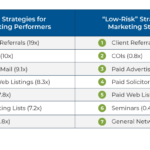
Given the industry’s growing focus on delivering financial advice in the best interests of their clients and not ‘just’ selling them financial products, financial advicers are increasingly wary about associating their practices with “sales” techniques. However, the reality is that even those in the business of advice (and not product sales) who are confident their services are of great value to clients must still bring prospects to the door and convince them to hire the advisor and pay for that advice. Which means regardless of how knowledgeable or capable an individual advisor may be, or how well their expertise may fit a client’s needs, getting a prospective client to commit requires both expertise and persuasion.
In his book Influence: The Psychology of Persuasion, Robert Cialdini presents research that helps demonstrate how advisors can leverage three simple influence tools to better aid (and retain!) clients who may already be coming to an advisor for answers but still need a nudge to actually engage the advisor… ultimately allowing advisors to save time and help more people.
First, creating a perception of scarcity around what a financial advisor offers can crystalize the value of the advisor and motivate clients to action. One way this can be done is to use a scheduling approach that involves “surge meetings”, where advisors schedule prospects and clients in a very structured and condensed time period (and not offering meeting slots outside of those ‘scarce’ time windows). Not only is this helpful to free up time for the advisor to focus on firm infrastructure and other priorities, but the apparent scarcity of available meetings tends to discourage prospects who aren’t ready to commit to working with an advisor from signing up, yet motivates clients who are ready to sign up for coveted meeting slots to take action. Which means that the people with whom advisors meet are much more likely to be ready to act in concrete ways and implement recommended changes.
Cialdini also proposes the idea of consistency, whereby individuals tend to strive for behavior that aligns with how they identify themselves. Thus, if a client views themselves as a proactive doer (opposed to a passive drifter), they are much more likely to commit to taking action – and advisors can leverage the client’s tendency to behave consistently with their ideal self-image by speaking directly to ‘doers’ in their marketing. Additionally, a goals-based planning approach can be a powerful motivator by helping clients identify their financial planning priorities, such that they feel ‘compelled’ to follow through on their financial planning recommendations to ensure their behaviors will align with their ideal future self-image.
Finally, advisors can use reciprocity as a way to persuade prospects to become clients and ultimately build the advisor’s business. Letting prospects test-drive the client experience (by offering a free preview of available planning services) can attract prospects and increase referrals, as this gesture of reciprocity can demonstrate the advisor’s value and skill by offering a clear example of what is actually delivered to clients. Exactly what is given away to prospects, and how, is up to the individual advisor, but treating a prospective client as if they have already joined the team is a great way to ensure that they actually do join the team!
Ultimately, it is important to remember that clients investigate and hire financial advisors because they want help to reach their goals. Advisors who are client-focused and have a good advice service to market can benefit from using Cialdini’s principles to persuade potential clients who would benefit from their help to take the leap into hiring them. By using Cialdini’s research to adapt strategies for use with clients, financial advisors can remove some of the resistance that prospects may initially feel by promoting trust, allowing clients to realize the reason that they sought out a financial advisor in the first place!










